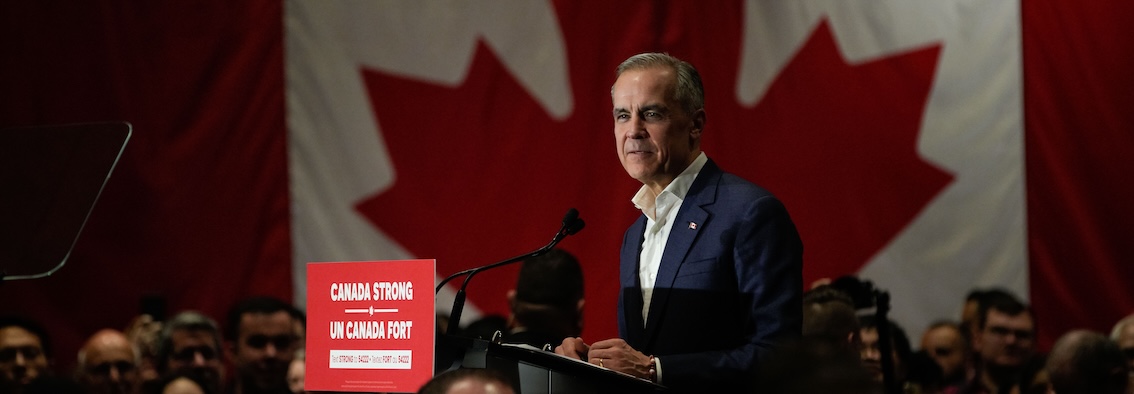Introduction
The Canadian elections held on April 28 have again elected a Liberal Party minority government. Considering that the Conservative Party had been leading national polls since mid-2023, the Liberals’ victory was a surprising upset aided by strained Canada-US relations. While the reelection of a Liberal government indicates that there will likely be an overall continuity in Canadian policies, there are still questions about the strength of cross-party support for Taiwan—and whether the current momentum towards closer Canada-Taiwan relations will continue.
Canada-Taiwan Relations Over the Past Five Years
Like many countries, Canada’s historical relations with Taiwan have fluctuated over the years. After Ottawa broke off official relations with the Republic of China in 1970, the government—in a manner similar to the United States—established a “One-China Policy” that “recognizes the [People’s Republic of China (PRC)] as the sole legitimate government of China, but neither endorses nor challenges the PRC’s position on Taiwan.” Still, the two countries continued to engage informally through people-to-people exchanges. The establishment of a Canadian Trade Office (CTO) in Taipei in 1986 and the reciprocal establishment of a Taipei Economic and Cultural Representative Office (TECRO) in Ottawa in 1991 further strengthened Canada-Taiwan ties. As a result, from 2015-2019 bilateral trade between Canada and Taiwan grew more than 15 percent, and a Canada-Taiwan avoidance of double taxation agreement was signed in 2016. Overall, while the two countries have maintained ties and Canada’s One-China Policy does not bar it from Taiwan engagement, Ottawa has avoided taking a clear stance on Taiwan’s sovereignty due to concerns of provoking the PRC.
However, there has been a marked shift in Canada-Taiwan relations in recent years. Due to worsening Canada-PRC relations (triggered by Canada’s detainment of the PRC citizen Meng Wanzhou [孟晚舟], and the PRC’s subsequent detainment of Canadian citizens Michael Kovrig and Michael Spavor) and rising PRC aggression, Canada introduced its own Indo-Pacific Strategy (IPS) in 2022. Simultaneously noting that “China is an increasingly disruptive global power,” and that “Canada will oppose unilateral actions that threaten the status quo in the Taiwan Strait,” the IPS also highlighted areas of cooperation with Taiwan and asserted that Canada would support Taiwan’s resilience. Additionally, Canada also began to take a more active stance towards security in the Taiwan Strait, with Canada and the United States conducting their first joint naval transit through the Taiwan Strait in 2021 and further joint transits occurring in 2022, 2023 and 2024.
In 2023, the release of an interim report by the Special Committee on the Canada–People’s Republic of China Relationship, titled Canada and Taiwan: a Strong Relationship in Turbulent Times, further examined the Canada-Taiwan engagement and outlined 34 recommendations for strengthening relations and supporting Taiwan. Framed within the context of countering PRC aggression and promoting Taiwan’s resilience, the report encouraged increased diplomatic engagement, closer economic ties, and supporting Taiwan’s meaningful participation in multilateral organizations. Additionally, it outlined specific areas of shared interest in the economic empowerment of indigenous populations (Taiwan and Canada are co-founders of the Indigenous Peoples Economic and Trade Cooperation Arrangement), disinformation, critical minerals, semiconductors, and supply chain resilience. Upon the report’s publication, Taiwanese Representative to Canada Harry Tseng (曾厚仁) emphasized that the comprehensive nature of the report made it the “most significant development in Taiwan-Canada relations since the two nations severed diplomatic ties in 1970.”
Since its publication, Ottawa has addressed many of the recommendations made in the report. For instance, Ottawa carried out Recommendation 11 and signed a Foreign Investment Promotion and Protection Arrangement (FIPA) with Taiwan in December 2023. After the establishment of a FIPA, Taiwan direct investment in Canada has increased dramatically, jumping from CAD 2.2 billion (roughly USD 1.6 billion) in 2023 to CAD 7.3 billion (roughly USD 5.3 billion) in 2024. Trade between Taiwan and Canada has also benefited from the 2024 signing of a Mutual Recognition Agreement on Authorized Economic Operators and their shared endorsement of a “Collaborative Framework on Supply Chains Resilience,” both of which aim to make supply chains more secure and mutually beneficial. In 2023, Canada also succeeded in getting Taipei to relax restrictions on Canadian beef. From February 2024 to February 2025 Canada’s beef and veal exports to Taiwan increased by 26.3 percent. Beyond agriculture and direct investment, Canada and Taiwan also signed a Science, Technology, and Innovation Agreement in 2024 to expand cooperation in key sectors, such as artificial intelligence (AI), biotechnology, and semiconductors.

Image: Then-President Tsai poses for a group photo with a Canadian parliamentary delegation attending the 2024 Taiwanese presidential inauguration. (Image source: Office of the ROC President)
In addition to closer economic ties, Canada has also been active in its diplomatic engagement with Taiwan. For instance, Canadian parliamentary delegations visited Taiwan in April 2023 and May 2024. Both delegations were led by Liberal members of parliament (MPs) and included Liberal, Conservative and Bloc Quebecois MPs, which shows that Canada’s support for Taiwan cuts across party lines. Notably, two Canadian MPs (from the Liberal and Bloc Quebecois parties) also attended the Inter-Parliamentary Alliance on China’s (IPAC) Taipei Summit. In contrast, no US members of IPAC attended the summit. Following former President Tsai Ing-wen’s (蔡英文) attendance at the 2024 Halifax International Security Forum (held in Halifax, Nova Scotia), the first Asian iteration of the forum took place in Taipei in February of this year. While the full guest list for the event has not been made public, former Defense and Foreign Affairs Minister Peter MacKay was among those who attended. Peter MacKay was also among the speakers at Taiwan’s 2022 Yushan Forum, which focuses on Taiwan’s New Southbound Policy, and former Industry and Health Minister Tony Clement attended the 2025 Yushan Forum.
Canadian participation in IPAC’s Taipei Summit, Taipei’s Halifax Security Forum, and the Yushan Forum—which span topics from countering PRC aggression, to defense and security and regional ties—highlights the wealth of shared interests between Taiwan and Canada. In mid-2024, Canada also joined Taiwan, the United States, Japan, and Australia in becoming a full partner of the Global Cooperation and Training Framework (GCTF). At last year’s 2024 GCTF Joint Committee Meeting, the partners outlined key areas for 2025, including preventing drug-related crimes, whole-of-society resilience, energy sustainability, public-private partnerships in humanitarian assistance and disaster relief, and using media literacy to counter information manipulation and interference.
What’s Next?
Leading up to the 2025 elections, some had raised concerns about Prime Minister Mark Carney’s past ties to China. Additionally, it was evident that Beijing preferred a Carney victory. Hurting from US tariffs, a Liberal government under Carney might be tempted by the economic incentives of closer ties with China. Yet, ahead of the election, Prime Minister Carney affirmed that China is Canada’s biggest threat and that it is “a threat within broader Asia and to Taiwan.” The Asia Pacific Foundation of Canada noted that Prime Minister Carney is “likely to keep China at an arm’s length” while strengthening ties with Japan, South Korea, Australia and potentially India. If Canada remains adamant that China is a threat, then it will need to seek out additional partners as it refines its Indo-Pacific policies—which is also an opportunity for Canada-Taiwan relations to continue to thrive.
To build upon the existing momentum, Ottawa should:
- Continue to counter the PRC’s misuse of United Nations (UN) Resolution 2758 and reaffirm that Canada’s “One-China Policy” does not bar Canadians from engaging with Taiwan.
After the IPAC Taipei Summit, Canada’s House of Commons unanimously passed a motion that UN Resolution 2758 “does not establish PRC sovereignty over Taiwan nor determine Taiwan’s future status in the UN or any international agencies.” While this is an important step in countering the PRC’s efforts to isolate Taiwan through the use of lawfare, the motion alone is not enough. Ottawa should ensure that Canadians—and especially government employees—are aware of the distortion of UN Resolution 2758 and understand that Canada’s “One-China Policy” does not bar engagement with Taiwan. As University of Ottawa Professor Scott Simon has noted, “As a sovereign state, Canada has the right to define that policy and determine our own relationship with Taiwan without external interference.” By making Canadians aware of these differences between these stances, they will both become less vulnerable to PRC coercive efforts that isolate Taiwan and will gain a better understanding of Taiwan’s geopolitical context.
- Continue asserting the importance of peace and stability in the Taiwan Strait through joint naval transits, regional defense cooperation, and statements of support for Taiwan.
The Canada-US joint naval transits from 2021 to the present have helped to promote Canada as a reliable partner in the Taiwan Strait. However, Canada could take a greater role as a partner by joining regional security partnerships like the Quadrilateral Security Dialogue (the Quad) or AUKUS. More informally, Canada should also look for ways to increase cooperation with Taiwan’s coast guard and on defense training, just as the United States does already. Additionally, Ottawa should continue to push back on PRC efforts to establish a new normal in the Taiwan Strait by condemning PRC incursions, as it did in the recent G7 statement.
- Explore areas of shared interest between Canada and Taiwan, especially when it comes to Canada’s Indo-Pacific Strategy and Taiwan’s New Southbound Policy (NSP).
Canada-Taiwan relations over the past five years have grown so much due to the abundance of shared interests between both countries. However, there are still opportunities to build further on these shared interests. For instance, although Taiwan and Canada have already signed agreements on investment promotion and science and technology, former MP Tony Clement has urged Canada and Taiwan to work even more closely on AI technology and supply chain resilience. In addition to AI, Canada and Taiwan could partner on tackling shared global challenges like countering disinformation, energy sustainability, and foreign aid programs. International Christian University Professor Stephen Nagy has also pointed out that Canada’s IPS overlaps significantly with Taiwan’s NSP—making Taiwan a reliable like-minded ally as Canada pursues Canadian interests in the Indo-Pacific.
- Pass legislation that creates a foundation for closer Canada-Taiwan relations, such as the Canada-Taiwan Relations Framework Act.
In 2021, Conservative MP Michael Cooper introduced the Canada-Taiwan Relations Framework Act, also known as Bill C-343. The Act clarifies Canada’s “One-China Policy,” promotes defense cooperation between Canada and Taiwan, and supports Taiwan’s participation in multilateral international organizations. Still—as of this article’s publication—the Act has not undergone a second reading. To build upon the momentum of recent Canada-Taiwan cooperation, Canadian policymakers should prioritize passing legislation that can create a strong foundation for all future Canada-Taiwan relations—either by revisiting Bill C-343 or by creating new legislation. As a starting point, Ottawa could look at existing US-Taiwan legislation such as the Taiwan Relations Act or Taiwan Allies International Protection and Enhancement Initiative (TAIPEI) Act, and tailor such legislation to Canada-Taiwan relations.
The main point: Over the past five years, Canada-Taiwan relations have grown in multiple areas, including closer economic ties, increased diplomatic engagement, and signed agreements relating to shared areas of interest. To build upon this momentum, a new Liberal government should continue to clarify Canada’s “One-China Policy,” assert the importance of peace and stability in the Taiwan Strait, build upon areas of shared interest between Canada and Taiwan, and pass legislation that creates a strong foundation for future Canada-Taiwan relations.




